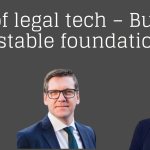We speak to Linklaters dispute resolution partner Ben Packer about the two-year Opus 2 Investigations development project, which digitises the investigations process globally at the magic circle firm.
Linklaters has rolled out Opus 2 Investigations across its global network following a two-year development project, in which lawyers involved in the rollout were able to ‘buy’ hours from Linklaters’ Innovation Steering Group bank.
Linklaters has long used Opus 2 for its online hearing and trial bundling capabilities. Led by dispute resolution partner Ben Packer and financial regulation partner Nik Kiri, the firm looked for a way to digitise its investigations process, which are typically manual and paper heavy.
Speaking to Legal IT Insider, Packer said: “We do a lot of investigations in the financial services sector, and they tend to be huge in scope – a typical investigation might have several million documents that you ingest into Relativity, and you often end up with a core set of 300 documents and interviews with 20 people.
“The problem is that the way of bringing it together was quite manual. I would mark up what was interesting to me, and the client would do the same elsewhere. The same thing would happen re the chronology, and interview and evidence assessment, it was all manual, with ‘who said what’ entered into an Excel table. Pre-Covid, interview bundles were hard copy, and you would fly around the world with them, which has security risks and is cumbersome.”
While Opus 2 had the closest offering to what Linklaters was looking for, the past two years have seen a significant amount of work from both sides to develop the platform, involving multiple iterations. Following a period of user acceptance testing this year, the platform went live a month ago.
Fee-earners were able to apply to the Innovation Steering Group bank to fund some of the hours they invested in the project. Linklaters funds the ISG bank to cover hours spent by lawyers on innovation projects, meaning they are not effectively penalised for undertaking non-chargeable time – a barrier to many technology initiatives for fee-earners.
While the investigations platform was originally intended for use by financial services lawyers, this has been opened up, as it became clear that the platform is also in demand by the likes of the data privacy team, or any team engaged in investigations.
In terms of its functionality, Opus 2 is not intended to replace eDiscovery software such as Relativity, which Linklaters uses to do the initial review. However, it is used to mark up and connect interviews and evidence. Packer says: “This is a critical feature. If you’re preparing an interview and you use the right code for the document when you ingest the note, it will link that part of that interview to that document. Side by side is the interview note.”
In an investigation, you can’t get a real sense of the case until you have pieced together the chronology, and this would previously have been a very manual exercise in Microsoft Word. Packer says: “Here when you ingest those documents it creates a chronology automatically. You can say you don’t want that in or to summarise it differently but every time you upload a document it updates the chronology.” This saves a significant amount of time on admin and preparation work that clients typically do not pay for.
A further key development, Packer says, is that you can quickly make interview bundles, including segregated versions of documents, which means that people being interviewed as part of the investigation do not see your annotations.
Opus 2 is a private cloud platform and had to satisfy multiple data security requirements. The fact that the company is ISO 27001 and Cyber Essentials Plus accredited was an important factor, and Packer says: “A big part of this project was vetting data security – this was given the highest priority.”









